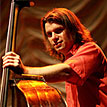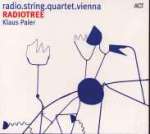Home » Jazz Articles » Live Review » Matthew Shipp & the Roy Campbell/Joe McPhee Quartet in Antwerp
Matthew Shipp & the Roy Campbell/Joe McPhee Quartet in Antwerp
They navigated in and out of such forms with practiced ease, negotiating transitions, solos and group interaction with preternatural assurance
Tribute to Albert Ayler
deSingel International Arts Center
Antwerp, Belgium
September 6, 2008
Themed around the iconoclastic '60s saxophonist Albert Ayler, the evening's fare at the modern deSingel International Arts Center on the edge of Antwerp city center was an intriguing mix of the new, the old and, in terms of the heritage underpinning what we heard, even the older. Proceedings commenced with a late afternoon screening of the documentary My Name is Albert Ayler, which I missed, but then continued with a solo set by pianist Matthew Shipp, followed by the Roy Campbell/Joe McPhee Quartet's Tribute to Albert Ayler. Seating was set up on the stage of the large Blauwe Zaal, making for an intimate space, which allowed unamplified performance, except for the bass. Excellent acoustics combined with a respectful audience resulted in a wonderful ambience in which even the quietest sounds rang out with absolute clarity.
 Shipp, clad in a black Vision9 T-shirt, pierced the anticipatory hush with the lyrical shimmering of "Patmos" from his solo outing One (Thirsty Ear, 2005), beginning a non-stop journey just shy of an hour. Both old and new were accounted for in the seamless outpouring, with standards enveloped inside the pianist's own themes. Solo, Shipp invested even more in repeated rhythmic patterns than with his latest trio of Joe Morris and Whit Dickey. Even so his sound could take on an almost classical austerity until familiar chord patterns or heads appeared blinking amid the stabbing and pounding keys. Once engaged with a standard, Shipp's method was to isolate some kernel from the tune and then test it to destruction. So a florid fancy might be punctuated by an avalanche of repeated two-handed clusters, until he released the tension with a fleeting reference to the tune, then perhaps slow-mo flailing at the keyboard, or juxtaposing a treble figure with the right hand against crashes from the palm and heel of his left hand.
Shipp, clad in a black Vision9 T-shirt, pierced the anticipatory hush with the lyrical shimmering of "Patmos" from his solo outing One (Thirsty Ear, 2005), beginning a non-stop journey just shy of an hour. Both old and new were accounted for in the seamless outpouring, with standards enveloped inside the pianist's own themes. Solo, Shipp invested even more in repeated rhythmic patterns than with his latest trio of Joe Morris and Whit Dickey. Even so his sound could take on an almost classical austerity until familiar chord patterns or heads appeared blinking amid the stabbing and pounding keys. Once engaged with a standard, Shipp's method was to isolate some kernel from the tune and then test it to destruction. So a florid fancy might be punctuated by an avalanche of repeated two-handed clusters, until he released the tension with a fleeting reference to the tune, then perhaps slow-mo flailing at the keyboard, or juxtaposing a treble figure with the right hand against crashes from the palm and heel of his left hand.
Halfway through, "Key Swing," a current Shipp mainstay from Piano Vortex (Thirsty Ear, 2007), burst from the mix before being subjected to all manner of indignities, though nonetheless maintaining clearer links to the mother lode than has been sometimes apparent in his trio deconstructions. Shipp became increasingly animated, stomping his foot as if to release excess energy, before a more romantic passage, incorporating fragments of the theme in the treble register, which returned in its pomp, only to then segue into an elegant promenade.
Such contrasts in attack, dynamics and timbres were the currency in which Shipp traded, sound pitched against sound, rather than silence, in the unceasing flow. Another composition from One, "Module" with its juxtaposition of two motifs in succession, signaled another rich vein for inspection, developed with a crystalline beauty, before Shipp quietened to silence, prompting enthusiastic applause from the rapt audience. Their appreciation was rewarded with a brief encore: a fast rolling line, evolved into subterranean rumbling, presaging a prancing passage, stabbing hands and a sudden stop.
After a brief interval, the concert resumed with the Roy Campbell/Joe McPhee Quartet's Tribute to Albert Ayler. Not content with being the featured horn in one Ayler tribute band (Marc Ribot's Spiritual Unity), trumpeter Roy Campbell has convened an all-star group to further celebrate the tragic saxophonist's legacy. Alongside him in the front line was multi-instrumentalist Joe McPhee, here on tenor and soprano saxophones and pocket trumpet, while the propulsive duties resided in vastly experienced percussionist Warren Smith and bassist William Parker, who has long been pivotal to the NYC free jazz scene. This aggregation is not new: they played together in a well received set at the 2003 Vision Festival, but this short tour was their first time under the Ayler moniker.
While several Ayler tunes emerged from the cut and thrust of the two free flowing pieces comprising the 65-minute set, they also sat alongside gospel and spiritual songs, recorded by Ayler, making explicit links between the saxophonist and his church and gospel heritage. Of course, the context within which they are heard has changed --- what was once new and shocking has become the touchstone for what producer Bob Rusch has termed "the mellow avant-garde." That phrase was coined with regard to McPhee's Trio X, but equally applies to the output of this group. With each member having played in this art form for longer than Ayler was on the planet, it is no surprise that they navigated in and out of such forms with practiced ease, negotiating transitions, solos and group interaction with preternatural assurance.
Smith's dancing mallets opened their set, before Campbell smeared breathy squeals on flugelhorn in a sparse duet. Gradually Parker added scrabbling bass runs, with McPhee finally moving forward from the rear of the stage to contribute powerful free-form tenor saxophone, in an open four-way improvisation which imperceptibly blended into "Our Prayer" (written by Ayler's brother Donald). McPhee raised his horn to cue a unison line with Campbell, over Parker's elegiac arco drone, deploying a broad vibrato, while swaying from side to side as he referenced Ayler's legacy with falsetto asides. Campbell, now on trumpet, tailgated him, cutting up rough with holy roller cries, before they returned to the aching theme.
As they eased down, Smith began a solo with larger mallets, acting as the transition into a further passage of group interaction. Improvisations and themes meshed organically, with one particular highlight being a soaring, painfully beautiful version of "Ol' Man River," tenderly and reverentially stated over clattering drums and arco bass, which formed the launch pad for an eruption of molten squawking from McPhee's vocalized tenor, in loose counterpoint with Campbell's growling and spluttering flugelhorn.
Making possible the conversational sparring of the horns was a flexible and dynamic rhythm section where Smith brought a wonderful compositional sensibility to the placement of sound, both in ensembles and solos. In his quest for the right texture he left his drum stool to circle his kit, all the while playing the stand, the rims and any other surface which appealed, before a prolonged tattoo on the cushion of his stool heralded the resumption of a more conventional position. Parker was in similarly adventurous mode this evening, giving full rein to his wonderful arco playing, with one tour de force of rhythmic sawing morphing into a pizzicato riff to ignite the ensemble once more.
Instruments, textures and dynamics shifted constantly through the unbroken 50-minute-long first piece. After group introductions by Campbell, resplendent in a blue shirt with bright yellow Egyptian figures, McPhee consulted with Parker, who led off with a rich, warmly measured introduction which metamorphosed into a beautiful reading of "Goin' Home," a hymn based on the theme from Dvorak's Symphony No. 9 and a longtime favorite of McPhee's, who invests these spirituals with a profound emotional heft. As the horns loosened up with intertwining squeals, Campbell interjected "Ghosts" and a medley of other Ayler themes for a spirited conclusion.
The spellbound audience responded with a standing ovation, which demanded an encore—a fizzing trumpet duel amid a blizzard of notes—for a splendid conclusion to a deeply fulfilling evening which reaffirmed the golden thread between this music and its antecedents.
Photo Credit
John Sharpe
Visit Matthew Shipp on the web. Matthew Shipp at All About Jazz.
Visit Roy Campbell on the web. Roy Campbell at All About Jazz.
Visit Joe McPhee on the web. Joe McPhee at All About Jazz.
Tags
PREVIOUS / NEXT
Support All About Jazz
 All About Jazz has been a pillar of jazz since 1995, championing it as an art form and, more importantly, supporting the musicians who make it. Our enduring commitment has made "AAJ" one of the most culturally important websites of its kind, read by hundreds of thousands of fans, musicians and industry figures every month.
All About Jazz has been a pillar of jazz since 1995, championing it as an art form and, more importantly, supporting the musicians who make it. Our enduring commitment has made "AAJ" one of the most culturally important websites of its kind, read by hundreds of thousands of fans, musicians and industry figures every month.
























